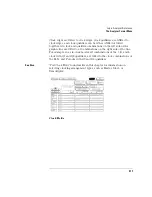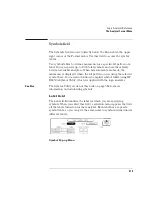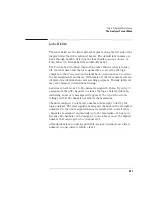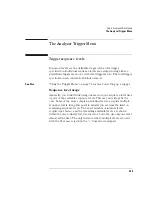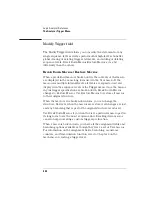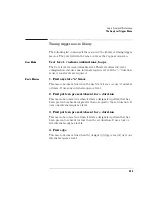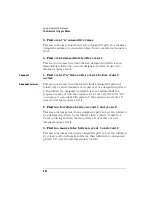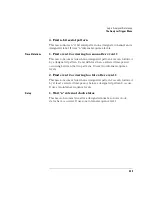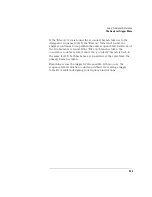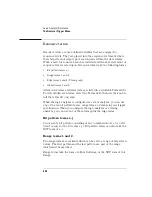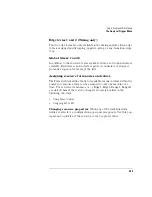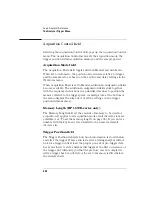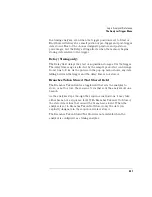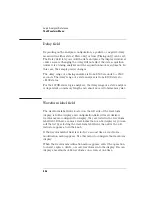
331
Logic Analyzer Reference
The Analyzer Trigger Menu
As the analyzer executes the trigger specification, it searches for a
match between the resource term value and the data. When a match is
found, that part of the sequence statement becomes true and the
sequencing continues to the next part of the statement or the next
sequence level.
Eventually a path of "true" resource terms leads to your trigger
command. If timers or occurrence counters are used, the analyzer
waits or counts occurrences of a specified value before continuing.
The following examples illustrate the use of resource terms,
occurrence counters, timers, branching, and store qualification. You
will use them in your trigger specification either by themselves or
combined with each other.
Using bit patterns, ranges, and edges
Bit patterns are set to match specific data values, and ranges are set to
match a range of bit patterns. In the Timing Acquisition mode, edges
are set to match specific edges of a timing pulse.
Using storage qualification
Store qualification lets you store all data, no data, or just selected data,
before trigger occurs.
Setting < and > durations (Timing only)
When a resource term is found during a timing sequence evaluation,
you can dictate how long the term must remain before it actually
becomes true. When less than (<) or greater than (>) duration is
assigned, the secondary branching (Else on) is not available.
> field.
When greater than (>) is used, the analyzer continues
sequence level evaluation only after the resource term has been true
for greater than or equal to the amount of duration specified.
< field.
When less than (<) is used, the analyzer continues sequence
level evaluation only after the resource term has been true for less than
or equal to the amount of duration specified. Using less than requires
four sequence levels.
Summary of Contents for 1670E Series
Page 6: ...6 In This Book...
Page 26: ...26 Contents...
Page 27: ...27 Section 1 Logic Analyzer...
Page 28: ...28...
Page 29: ...29 1 Logic Analyzer Overview...
Page 39: ...39 2 Connecting Peripherals...
Page 49: ...49 3 Using the Logic Analyzer...
Page 72: ...72 Using the Logic Analyzer The Inverse Assembler...
Page 73: ...73 4 Using the Trigger Menu...
Page 101: ...101 5 Using the Oscilloscope...
Page 151: ...151 6 Using the Pattern Generator...
Page 199: ...199 7 Triggering Examples...
Page 237: ...237 8 File Management...
Page 249: ...249 9 Logic Analyzer Reference...
Page 360: ...360 Logic Analyzer Reference The Compare Menu...
Page 361: ...361 10 System Performance Analysis SPA Software...
Page 397: ...397 11 Logic Analyzer Concepts...
Page 430: ...430 Logic Analyzer Concepts The Analyzer Hardware Oscilloscope board theory Oscilloscope board...
Page 439: ...439 12 Troubleshooting the Logic Analyzer...
Page 455: ...455 13 Specifications...
Page 471: ...471 14 Operator s Service...
Page 479: ...479 Operator s Service Troubleshooting Troubleshooting Flowchart 2...
Page 491: ...491 Section 2 LAN...
Page 492: ...492...
Page 493: ...493 15 Introducing the LAN Interface...
Page 497: ...497 16 Connecting and Configuring the LAN...
Page 506: ...506 Connecting and Configuring the LAN Connecting and Configuring the LAN...
Page 507: ...507 17 Accessing the Logic Analyzer File System Using the LAN...
Page 515: ...515 18 Using the LAN s X Window Interface...
Page 527: ...527 19 Retrieving and Restoring Data Using the LAN...
Page 539: ...539 20 Programming the Logic Analyzer Using the LAN...
Page 546: ...546 Programming the Logic Analyzer Using the LAN Programming the Logic Analyzer Using the LAN...
Page 547: ...547 21 LAN Concepts...
Page 555: ...555 22 Troubleshooting the LAN Connection...
Page 580: ...580 Troubleshooting the LAN Connection Getting Service Support...
Page 581: ...581 Section 3 Symbol Utility...
Page 582: ...582...
Page 583: ...583 23 Symbol Utility Introduction...
Page 588: ...588 Symbol Utility Introduction Symbol Utility Introduction...
Page 589: ...589 24 Getting Started with the Symbol Utility...
Page 597: ...597 25 Using the Symbol Utility...
Page 609: ...609 26 Symbol Utility Features and Functions...

